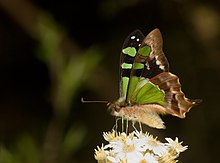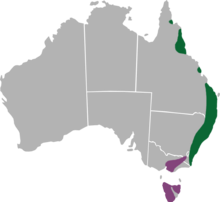|
Graphium macleayanus
Graphium macleayanus, the Macleay's swallowtail, is a butterfly belonging to the family Papilionidae. The species was named after Alexander Macleay.[2][3] TaxonomyMacleay's swallowtail was first described by William Elford Leach in 1814. Two subspecies are recorded in Australia,[1] the nominate form, G. m. macleayanus and G. m. moggana, which was first described by Leonard Edgar Couchman in 1965.[4] The name is synonymous with Papilio macleayanus. Description The caterpillar grows to a length of 4 cm. The pupa is green with thin yellow lines. The adult female Macleay's swallowtail has a wingspan of 59 mm, whilst the adult male has a wingspan of 53 mm.[5] The upperside of the wing is green with white markings and black edges.[6] The lower surface is a deeper green with black, brown and white markings.[6] The lower wings are strongly tailed.[7] Distribution and habitatThe Macleay's swallowtail is one of the most widely distributed swallowtail butterflies in Australia.[8] It is found in eastern Australia including the ACT, New South Wales, Queensland, Victoria and Tasmania. It is the only swallowtail found in Tasmania.[9] The species has also been found on Lord Howe Island and Norfolk Island, but not since 1893.[1] The habitat of the species includes urban areas, forests, woodlands and heath.[10] BehaviourThe caterpillars are green, with small white dots all over the body and a humped thorax. They feed on the foliage of members in the Atherosperma, Cinnamomum, Cryptocarya, Daphnandra, Doryphora, Endiandra and Tasmannia genera.[11] The adults feed on nectar from flowers, including the genera Leptospermum, Lantana and Buddleia.[5] The flight period is from August to March.[12] See also
References
External linksWikimedia Commons has media related to Graphium macleayanus.
|
||||||||||||||||||||||||||||||||

